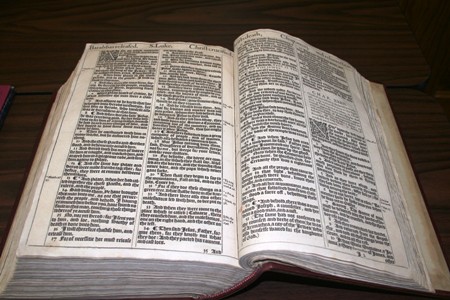





Liberalism or sometimes called Modernism is a major shift in theological thinking which occurred in the late nineteenth century. Liberals insist that the world has changed since the time Christianity was founded so that biblical terminology and creeds are incomprehensible to people today. Although most would start from the orthodoxy of Jesus Christ as the revelation of a savior God, they try to rethink and communicate the faith in terms which can be understood today.
It rejects religious belief based on authority alone, rather insists that beliefs must pass the tests of reason and experience. They point to the fact that the Bible is the work of writers who were limited by their times, it is neither supernatural nor an infallible record of divine revelation, and thus does not possess absolute authority. It sees God as present and dwelling within the world, not apart from or elevated above the world as a transcendent being. Liberalism also manifests a humanistic optimism. Society is moving toward the realization of the kingdom of God, which will be an ethical state of human perfection.
Theological liberalism originated in Germany in the late nineteenth century where most of the major theologians had studied. Many of them had come to accept the principles of higher criticism and Darwinism. Kant's ethical idealism and rejection of all transcendental reasoning about religion had the effect of limiting knowledge and opening the way for faith. Schleiermacher introduced the idea of religion as a condition of the heart whose essence is feeling. This made Christian doctrine independent of philosophical systems and faith a matter of individual experience of dependence upon God. Hegel went off in another direction with his absolute idealism, as this emphasized the existence of a rational structure in the world apart from the individual minds of its inhabitants. The main contributions of Hegelian idealism were support for the idea of divine immanence and the fostering of historical and biblical criticism.
Higher criticism questioned the authorship and dating of much of the biblical literature and rejected the traditional understanding of the Scriptures as divinely revealed oracles. The life of Jesus was studied with the intent of striping off the dogmatic formulations of the church and getting back to the concrete, historical human personage.
Liberals welcomed the finding of science and readily accommodated to the challenge of Darwinism. Evolution vindicated divine immanence, since this explained how God had slowly built the universe through natural law. God revealed himself, they believe, through a evolutionary process, as the Israelites began with backward, bloodthirsty ideas and gradually came to understand that the righteous God could be served only by those who are just, merciful, and humble. Redemption is seen as the gradual transformation of man from a primitive state to that of obedient sonship to God. Just like the physical realm, culture and religion had evolved, and there was no fundamental antagonism between the kingdoms of faith and natural law.
Students of comparative religion have suggested that the religions of mankind evolved from lower stages to ever higher stages, the highest of all being monotheism. They propose that Israelite religion began as animism, the belief that every natural object is inhabited by a supernatural spirit. After animism the idea developed in Israel that some spirits were more powerful than others and deserved to be called 'gods.' Eventually the most powerful of all became preeminent above the others, and the people believed in his supreme authority and worshiped him alone. Finally, Israel became willing to admit that the lesser gods had no existence whatever. [Walter A. Elwell, ed, Evangelical Dictionary of Theology]
Liberalism portrayed Christianity as the syncretistic religion of the ancient Near East, denying its distinctiveness and the authority of the biblical canon. Christianity was merely one among many religions, all of which were relative to their time and circumstance, and thus it had no claim to finality.
Another manifestation of modernism was "primitivism" as taught by Jean Rousseau. He proposed that primitive man, "the noble save," was superior to civilized man. "If man is good by nature, it follows that he stays like that as long as nothing foreign to him corrupts him." It was this kind of thinking that prompted an artists like Paul Gauguin to desert his family and go to Tahiti in search of purity and freedom. It was the ideas of Rousseau that formed the basis for the French Revolution. Karl Marx, too, believed that we could achieve "heaven on Earth," once the corruptive influences of capitalism could be dismantled.
The major source of liberal religious ideas in the United States was Unitarianism. It modified the doctrines of divine sovereignty, human sin, and biblical revelation. Liberal theologians concerned themselves with building the kingdom of God and promoting the applied liberalism known as the social gospel. This emphasized the need to modify the corrupt society that in turn was corrupting man. Sin or evil is seen as imperfection, ignorance, maladjustment, and immaturity, not the fundamental flaw in the universe. These hindrances may be overcome, it is believed, by persuasion and education. Liberalism with its emphasis on the freedom and self-determination of man gave religious sanction to modern man's efforts to control his life by autonomous reason and improve conditions by relying on his own goodness. Progress was seen in the advance of political democracy, the movement for world peace, and efforts to end racial discrimination.
Traditional values and morals, along with any basic hope for the future, were really shattered by World War I. That even was so cataclysmic that it destroyed the faith that had been building throughout the 19th century in the inevitability of progress. After World War I it was no longer taken for granted that Western Civilization would survive, and many questioned whether a reliance on traditional values would enable it to do so. From the modernists perspective, one of the most basic assumptions of Western civilization was no longer credible - that is, that man could discern and solve every problem and thus control his world through reason. This thinking was further influenced strongly by Sigmund Freudís studies of the unconscious. He declared that it was really the unconscious and not reason that was master of human behavior.
By the 1930s some liberals moved much further to the left and turned to secular humanism (as reflected in their 1933 manifesto repudiating the existence of God, immortality, and the supernatural in general, and substituted faith in man and his capabilities.)
The destructive myth of Rousseaus' "the noble savage" was reconstituted in the revolutionary 1960s - that "if it feels good, do it" decade - and is still poisoning the minds and souls of Americans in the 1990s. Todayís sixties-style idealists who are running the White House, as well as many of our most influential cultural institutions, think that a risk-free, problem-free society remains a goal worthy of striving for. Naturally, government is always the vehicle of choice on the road to this elusive utopia. This futile paradise chase, consequently, enables government to do anything and everything necessary to address all human needs - real or imagined. Thus, the U.S. governmentís role in human affairs - which was once well defined and strictly limited by our Constitution - now extends to every conceivable facet of life.
Deprived of a Christian view of the cosmos as orderly and purposeful, the modernists came to see it as fragmented, chaotic and without transcendent meaning. Modernism was characterized by skepticism and radical questioning of the value of society, of morality, of reason, of religion, even of life itself. After all, if God does not exist, all things are permitted. Without God there is no foundation on which one can base values or beliefs - thus anything goes and nothing matters. [John Pototschnik, "The Foundations of Cultural Death," Lamplighter, May 1994].
The present generation has become the inheritors of the belief that there will never be a unified field of knowledge encompassing the physical universe and the spiritual. They have been encouraged to take a leap of faith while believing the new creed that the only faculty for making judgments they have is their inner senses. Rejecting the revelation of God, the intelligent man has no standard, no basis in truth, from which to make intelligent moral and religious discriminations. Tolerance has become the only way of dealing with conflicting, even contradictory worldviews. Each is viewed as being equally valid and as a matter of mere private opinion. The "all is permitted" attitude really reflects a widespread loss of values, a moral and intellectual impotence which breeds pseudomoralisms for any sort of gratification people pursue.